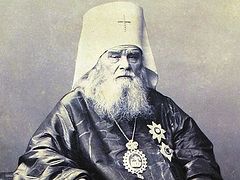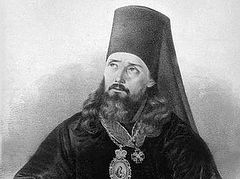There was one extraordinary meeting in the life of the Russian author Ivan Alexandrovich Goncharov1 that took place in the city of Yakutsk—a meeting with a holy man who was to be recognized later as a saint by the Russian Orthodox Church. On his way back from the Far East to St. Petersburg via Siberia, the author of The Frigate Pallada made the acquaintance of Innocent (Veniaminov), then Archbishop of Kamchatka, the Kuril Islands, and the Aleutian Islands, the future Metropolitan of Moscow.
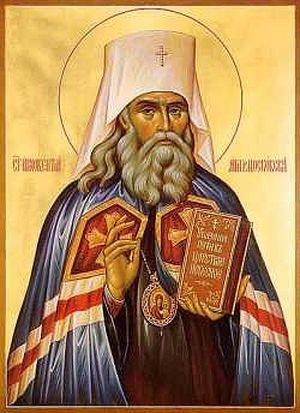 Holy Hierarch Innocent Holy Hierarch Innocent (born Ivan Evseevich Popov-Veniaminov; 1797–1879) was a prominent Church figure and a missionary, who enlightened the peoples of Eastern Siberia and Russian America. Initially he was a priest in Irkutsk; in 1823, he volunteered to go as a priest to Unalaska, one of the Aleutian Islands in Alaska, where he evangelized Aleutians. For this purpose he studied the Aleutian (also Aleut) language. Through his efforts Christianity was spread all over the Aleutian Islands. Then he was transferred to what is now Baranov Island and converted the Tlingits to Christianity. Widowed in 1840, he was tonsured and soon became Bishop of Kamchatka, the Kuril and Aleutian Islands. His apostolic ministry in Eastern Siberia lasted as long as twenty-seven years. The Holy Scriptures were translated into the Yakut, Aleutian, and Kuril languages. In 1868, he became Metropolitan of Moscow and Kolomna and headed the Russian Orthodox Mission Society. The holy hierarch fell asleep in the Lord on Holy Saturday of 1879. Wasn’t this a clear sign of his sainthood? Today his relics rest at the Holy Dormition Cathedral of the Holy Trinity-St. Sergius Lavra.
Holy Hierarch Innocent Holy Hierarch Innocent (born Ivan Evseevich Popov-Veniaminov; 1797–1879) was a prominent Church figure and a missionary, who enlightened the peoples of Eastern Siberia and Russian America. Initially he was a priest in Irkutsk; in 1823, he volunteered to go as a priest to Unalaska, one of the Aleutian Islands in Alaska, where he evangelized Aleutians. For this purpose he studied the Aleutian (also Aleut) language. Through his efforts Christianity was spread all over the Aleutian Islands. Then he was transferred to what is now Baranov Island and converted the Tlingits to Christianity. Widowed in 1840, he was tonsured and soon became Bishop of Kamchatka, the Kuril and Aleutian Islands. His apostolic ministry in Eastern Siberia lasted as long as twenty-seven years. The Holy Scriptures were translated into the Yakut, Aleutian, and Kuril languages. In 1868, he became Metropolitan of Moscow and Kolomna and headed the Russian Orthodox Mission Society. The holy hierarch fell asleep in the Lord on Holy Saturday of 1879. Wasn’t this a clear sign of his sainthood? Today his relics rest at the Holy Dormition Cathedral of the Holy Trinity-St. Sergius Lavra.
It should be noted that Goncharov with his natural intuition realized the scale of the personality of the holy hierarch, about whom Russian newspapers and magazines had begun to write by the time of their meeting. While preparing for the journey, Goncharov read much, and one of the themes was the Russian Church’s missionary activity in Siberia. First and foremost, he read the book by His Eminence, then still Archpriest John, Notes on the Islands of the Unalaska District (1840). The writer had a high opinion of the book: “Having read this material, you won’t need any other history of the young and little-known inhabited area. There is no deficiency in fullness or clearness of any branch of knowledge: whether it be ethnography, geography, topography, or natural history. The author devotes most of his attention to the state of the Church among the newly-converted people… This book is also remarkable for its fine, simple and vivid language” (I.A. Goncharov. The Frigate Pallada. L., 1986. P. 533). Goncharov read another booklet by Archpriest John, The State of the Orthodox Church in Russian America, too (1840). Besides those he may have read the books, Experience of the Grammar of the Aleutian and Fox Islands (St. Petersburg, 1846), and Observances on the Tlingit and Kodiak Languages (St. Petersburg, 1846). In the chapter, “Through Eastern Siberia”, the author admits that even before their personal meeting he “had heard and read a lot about His Eminence: on how he turned savages from among local indigenous people into true human beings, how he shared life with them, and so on” (ibid, p. 600). Our traveler may have also read Instructions to Missionary Priests, written by Bishop Innocent (Veniaminov) in 1841. In the Instructions we can find the following words: “It is a truly holy and apostolic work—to leave your native land and go to remote, wild places, which have hardly any amenities, in order to set those who still walk in the darkness of ignorance upon the path of truth and enlighten those who have not yet seen the saving light of the Gospel. Blessed is he whom the Lord will choose and ordain to this ministry.”
The author of The Frigate Pallada managed to discern the greatness of the future holy hierarch’s personality. He above all mentions “the apostle of Siberia” as the explorer of the shortest route to the Sea of Okhotsk: “An overland route from it to Yakutsk presents many inconveniences… Through the efforts of His Eminence Innocent, Archbishop of Kamchatka and the Kuril Islands, and the former Governor of Kamchatka Vasily Zavoiko, the current route to the Sea of Okhotsk was discovered and the port of Ayan was founded… If I am not mistaken, the first human being to tread this path in 1845 was His Eminence Innocent… He tried to find a new route to the sea because the previous one (leading from Yakutsk to Okhotsk) was considered inconvenient, and he paved the way to the building of the Yakutsk-Ayan Trail” (ibid, pp. 491-498).
Perhaps it is natural that for Goncharov the most memorable events were those important to him as a writer, namely the translation of the Gospels into the languages of Siberian ethnic groups: “I happened to be present at a meeting of the committee that meets in the quiet of the archpastor’s cell to translate the Gospel. All the churchmen here know the Yakut language. The rough draft of the translation is ready. When I was present at their meeting, they were revising and proofreading the Gospel of Matthew. They were collating the Greek, Slavonic and Russian texts with the Yakut translation. Each word was thoroughly weighed up and checked by all the members of the committee (p. 533).”
Goncharov saw the living embodiment of what he considered to be an ideal missionary in Archbishop Innocent, beginning from his appearance: “I imagined that the archpastor of the Siberian flock would look like other hierarchs serving to the east of the Urals: imposing, serious, and humble. The archbishop was informed about our arrival. He came out to meet us. Indeed he is an apostle, a missionary!...” These words have so much in common with the description of Archbishop Innocent by the St. Philaret (Drozdov), Metropolitan of Moscow: “There is something apostolic about that man” (Pravoslavnaya Moskva, 1997. Iss. 29-30. P. 1). The writer portrays a truly apostolic image of the future holy hierarch: “An impressive figure” arose before of him, “with bluish-silvery grey hair, beetling brows, intelligent and tender eyes glowing from under them, and a kind smile (p. 600).”
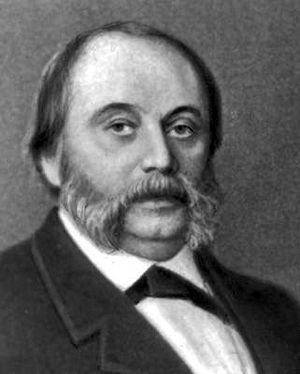 Ivan Alexandrovich Goncharov A few lines from the essay, “Through Eastern Siberia”, give us an idea of the conversation between Archbishop Innocent and Goncharov. “His Eminence inquired after my travels and the whole of our squadron closely (ibid, p. 601).” They also talked about the archpastor’s missionary work, about Metropolitan Philaret (Drozdov) of Moscow, of whose life and knowledge the future holy hierarch spoke “with great ardor”.
Ivan Alexandrovich Goncharov A few lines from the essay, “Through Eastern Siberia”, give us an idea of the conversation between Archbishop Innocent and Goncharov. “His Eminence inquired after my travels and the whole of our squadron closely (ibid, p. 601).” They also talked about the archpastor’s missionary work, about Metropolitan Philaret (Drozdov) of Moscow, of whose life and knowledge the future holy hierarch spoke “with great ardor”.
There is probably no other book of memories of the Holy Hierarch Innocent in which his traits of character and everyday behavior are sketched so accurately. The Frigate Pallada contains several interesting incidents from the saint’s life. In this sense Goncharov’s information is invaluable. Thus, we learn from his book that, “His Eminence never invited anybody to dine with him. He observed a strict monastic life: His diet consisted of fish soup and dairy products, and on fast days he observed the monastic rule. He maintained that secular people needed to have some meat for dinner (ibid, p. 606).” Archbishop Innocent however made an exception for Goncharov as for a welcome guest in that remote part of Siberia: He invited him for evening tea. “Then he offered me an arsenal of monastic treats, as he used to say. Apart from tea, he entertained me to prunes, raisins, almonds, and so on (ibid, p. 616).”
We cannot help but cite another account of the holy hierarch of himself. The fact is that Goncharov often met His Eminence at dinners in the houses of different people. And the writer was puzzled, knowing the archbishop’s purely monastic way of life. “One day he must have divined my thoughts and observed:
“‘You often meet me at receptions in the houses of local people, from the governor and regional officials to merchants. All of them make up one society here, in which only the governor and I stand out. Having once accepted the invitation of one of them, on what grounds will I decline the invitation of another?... That is why I visit everybody against my own will; but wherever I go, I am always offered my monastic dishes. I arrive, bless the food, listen to the singers, hardly touch the food and leave, putting my dinner at the others’ disposal.’ And the hierarch burst out laughing kindly (ibid, p. 606).”
Thanks to Goncharov’s essay we know what Archbishop Innocent liked to recall and talk about: “During those evening talks all subjects were discussed, particularly Nicholas I, the reigning monarch of that time. His Eminence used to tell me about his reception by the emperor, their conversations, and the questions His Majesty asked him regarding the inclement climate of Eastern Siberia. By the way, the archbishop recounted how in St. Petersburg he had received the news of his wife’s death and had been elevated to the rank of archimandrite, and then—of Archbishop of Yakutsk, the Kuril and Aleutian Islands.
“‘There is no church on the Kuril Islands,’ the reporter said.
“‘It will be built,’ His Majesty reassured him and continued writing (p. 607).”
The spiritual image of the holy hierarch is supplemented by the following story that Goncharov was told in Yakutsk: “We were at the cathedral on Paschal Sunday… The governor with all our officials and merchants… There were large crowds of people there.... The hierarch served with our clergy. After the Liturgy His Eminence blessed all of us and exchanged a triple Paschal kiss with each one of us. ‘Well, and now I ask all of you to follow me!’ he said… and he went to prison right after church. He exchanged a triple kiss with the inmates and gave each of them money from his slender means on the occasion of the feast. You should have seen his face at that moment. It was lucid, serene, and peaceful! Willy-nilly we opened our pockets and took out as much money as each of us could… In the end we collected a decent amount of money, all of which was used for to benefit the prisoners. And it was not until then that His Eminence blessed all of us again and let us go home… (p. 608)”
The archpastor’s cheerfulness and sense of humor were inimitable. On one occasion the governor invited him to dine with him and Goncharov. And what next? A scene imbued with light humor followed:
“‘His Excellency won’t invite me for a meager meal without an official request!’ the hierarch remarked not without irony. ‘For my part, Your Excellency, I am ready to obey the order; but I must report this to my bishop: I have no idea what decision he is going to make and whether or not he will allow Monk Innocent to leave his cell—even for a meager meal with the governor Peter…’
“He once again went off into fits of laughter, and we joined him (p. 601).”
Thus we discover the purely human character traits of St. Innocent. But after the release of the book on Metropolitan Innocent, Ivan Barsukov Goncharov gives us a historic scale of the holy hierarch’s personality: “He is a great historic personality. Much has been written, is being written and will be written about him. And the further Siberia is settled, comes to life and is made human, the higher and clearer this apostolic figure becomes… Behold a Siberian by birth, an apostle and missionary who was sent to us by the Almighty Himself! (p. 600)”
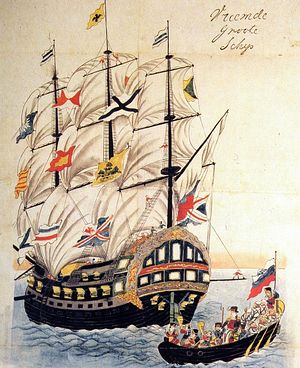 The frigate Pallada in Nagasaki. Drawing by Japanese artist In the book, The Frigate Pallada, we mainly find the everyday life background associated with the future holy hierarch. The author doesn’t say how he perceives the spiritual image of Metropolitan Innocent: we can only guess it. Goncharov portrays the archpastor without affectation, without rapture, and even describes some episodes, tinged with mild humor. Does it mean that the author didn’t sense the sainthood of his interlocutor? We should take into account the fact that Goncharov is very cautious when it comes to choosing words and assessing the spiritual nature of man, which is hidden from our eyes. In his works he avoids purely religious subjects, instead trying to represent spiritual things through everyday life. It is significant that in his letter to Grand Duke Konstantin Romanov, dated November 3, 1886, Goncharov observed: “Religion and the whole of life which is based on it is for the most part a high, spiritual and moral human life… I wouldn’t personally dare to create a religious plot, but he who is strongly attracted to this fathomless depth should necessarily write (the Russian Archive. T. U. M. 1994. P. 191).”
The frigate Pallada in Nagasaki. Drawing by Japanese artist In the book, The Frigate Pallada, we mainly find the everyday life background associated with the future holy hierarch. The author doesn’t say how he perceives the spiritual image of Metropolitan Innocent: we can only guess it. Goncharov portrays the archpastor without affectation, without rapture, and even describes some episodes, tinged with mild humor. Does it mean that the author didn’t sense the sainthood of his interlocutor? We should take into account the fact that Goncharov is very cautious when it comes to choosing words and assessing the spiritual nature of man, which is hidden from our eyes. In his works he avoids purely religious subjects, instead trying to represent spiritual things through everyday life. It is significant that in his letter to Grand Duke Konstantin Romanov, dated November 3, 1886, Goncharov observed: “Religion and the whole of life which is based on it is for the most part a high, spiritual and moral human life… I wouldn’t personally dare to create a religious plot, but he who is strongly attracted to this fathomless depth should necessarily write (the Russian Archive. T. U. M. 1994. P. 191).”
But what he said about the holy hierarch (“He is a great historic personality… And the further Siberia is settled, comes to life and is made human, the higher and clearer this apostolic figure becomes… Behold a Siberian by birth, an apostle and a missionary who was sent to us by the Almighty Himself!”) is indicative of his correct spiritual perception of Metropolitan Innocent’s personality. Goncharov writes even about his personal impression—something he would otherwise have never written about: “My personal impression was the happiest one.” All of this indicates that the figure of the future holy hierarch is perceived by him as an outstanding one, which goes beyond ordinary phenomena. By calling Metropolitan Innocent an apostle, Goncharov in effect recognizes his sainthood, thus manifesting his own keen spiritual vision.
A special point is the time of writing of two parts of the memories of Holy Hierarch Innocent. The first part dates back to the 1850s and was included in the book, The Frigate Pallada. At that time Goncharov didn’t display any strong religious inclination. His memories of Metropolitan Innocent are rather historical by nature here. In the chapter “From Yakutsk” the saint is portrayed as a missionary and translator of the Gospel into the languages of peoples of Siberia, on a par with other heroes (of whom he probably writes more), such as Archpriest Dimitry Khitrov, who compiled “A Concise Grammar of the Yakut Language”, along with Archpriest Nikita Zapolsky. We should also take into account the fact that the holy hierarch was still alive and most probably wouldn’t appreciate intimate details of his private life in the press. And he didn’t welcome commendation. Once the hierarch admitted: “Can I ascribe to myself anything that was done in my presence or through me? For God sees how hard it is for me to read or hear that I am praised for something… I admit I wish, if possible, that my name could be mentioned nowhere except in lists and names to pray for… (Pravoslavnaya Moskva. 1997. Iss. 29-30. P. 1)” As for the essay, “Through Eastern Siberia”, it was written later, in 1889, after the death of “the apostle of Siberia”. The 1860s saw a notable change in the writer’s spiritual life, when he was more seriously and deeply committed to Orthodoxy. There is an interesting piece of evidence on this matter. It is a letter by Archpriest Vasily Peretersky from St. Panteleimon’s Church in St. Petersburg to M.F. Speransky of November 11, 1912, which reads: “I have served at St. Panteleimon’s Church since 1869 permanently… Ivan Alexandrovich Goncharov lived in the same parish for over thirty years… He attended the house of God on Sundays and major feasts; every year he carried out his Christian duty by participating in the sacraments of confession and Communion [though it may sound strange, such was a requirement which applied to all Christians in the Synodal period in the Russian Empire: to confess and take Communion at least once a year and thus “carry out your Christian duty”.—Trans.] in his parish church… The reposed Ivan Alexandrovich, at least for the last twenty years of his life, was a truly faithful son of the Orthodox Church.” Besides that, it should be remembered that in 1883, the book by Ivan Barsukov entitled, Innocent, Metropolitan of Moscow and Kolomna, was published; and in 1887 the “Works” of Metropolitan Innocent were collected and released by the same Barsukov. In that period Goncharov perceived the figure of St. Innocent in a different light. As a result invaluable details of the writer Goncharov’s meetings with Metropolitan Innocent, interesting details of the everyday life and the missionary work of the future saint appeared in the press.


